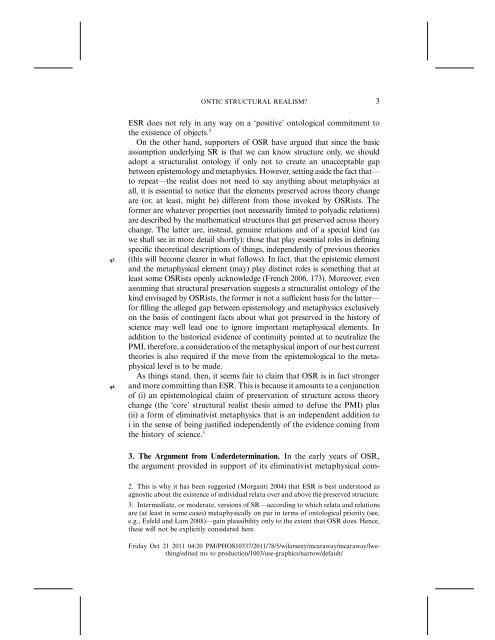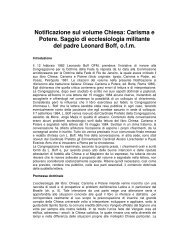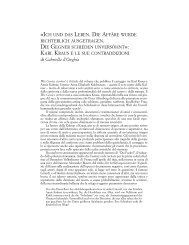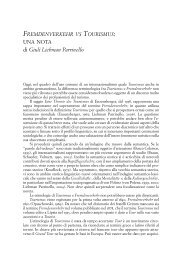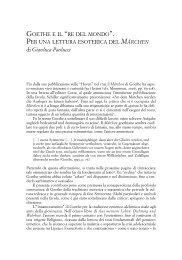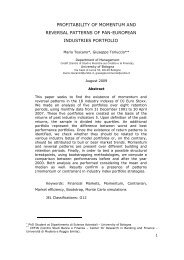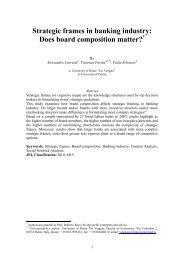Is There a Compelling Argument for Ontic Structural Realism?
Is There a Compelling Argument for Ontic Structural Realism?
Is There a Compelling Argument for Ontic Structural Realism?
You also want an ePaper? Increase the reach of your titles
YUMPU automatically turns print PDFs into web optimized ePapers that Google loves.
q3<br />
q4<br />
ONTIC STRUCTURAL REALISM? 3<br />
ESR does not rely in any way on a ‘positive’ ontological commitment to<br />
the existence of objects. 2<br />
On the other hand, supporters of OSR have argued that since the basic<br />
assumption underlying SR is that we can know structure only, we should<br />
adopt a structuralist ontology if only not to create an unacceptable gap<br />
between epistemology and metaphysics. However, setting aside the fact that—<br />
to repeat—the realist does not need to say anything about metaphysics at<br />
all, it is essential to notice that the elements preserved across theory change<br />
are (or, at least, might be) different from those invoked by OSRists. The<br />
<strong>for</strong>mer are whatever properties (not necessarily limited to polyadic relations)<br />
are described by the mathematical structures that get preserved across theory<br />
change. The latter are, instead, genuine relations and of a special kind (as<br />
we shall see in more detail shortly): those that play essential roles in defining<br />
specific theoretical descriptions of things, independently of previous theories<br />
(this will become clearer in what follows). In fact, that the epistemic element<br />
and the metaphysical element (may) play distinct roles is something that at<br />
least some OSRists openly acknowledge (French 2006, 173). Moreover, even<br />
assuming that structural preservation suggests a structuralist ontology of the<br />
kind envisaged by OSRists, the <strong>for</strong>mer is not a sufficient basis <strong>for</strong> the latter—<br />
<strong>for</strong> filling the alleged gap between epistemology and metaphysics exclusively<br />
on the basis of contingent facts about what got preserved in the history of<br />
science may well lead one to ignore important metaphysical elements. In<br />
addition to the historical evidence of continuity pointed at to neutralize the<br />
PMI, there<strong>for</strong>e, a consideration of the metaphysical import of our best current<br />
theories is also required if the move from the epistemological to the metaphysical<br />
level is to be made.<br />
As things stand, then, it seems fair to claim that OSR is in fact stronger<br />
and more committing than ESR. This is because it amounts to a conjunction<br />
of (i) an epistemological claim of preservation of structure across theory<br />
change (the ‘core’ structural realist thesis aimed to defuse the PMI) plus<br />
(ii) a <strong>for</strong>m of eliminativist metaphysics that is an independent addition to<br />
i in the sense of being justified independently of the evidence coming from<br />
the history of science. 3<br />
3. The <strong>Argument</strong> from Underdetermination. In the early years of OSR,<br />
the argument provided in support of its eliminativist metaphysical com-<br />
2. This is why it has been suggested (Morganti 2004) that ESR is best understood as<br />
agnostic about the existence of individual relata over and above the preserved structure.<br />
3. Intermediate, or moderate, versions of SR—according to which relata and relations<br />
are (at least in some cases) metaphysically on par in terms of ontological priority (see,<br />
e.g., Esfeld and Lam 2008)—gain plausibility only to the extent that OSR does. Hence,<br />
these will not be explicitly considered here.<br />
Friday Oct 21 2011 04:20 PM/PHOS10337/2011/78/5/wilarseny/mcaraway/mcaraway/lwething/edited<br />
ms to production/1003/use-graphics/narrow/default/


